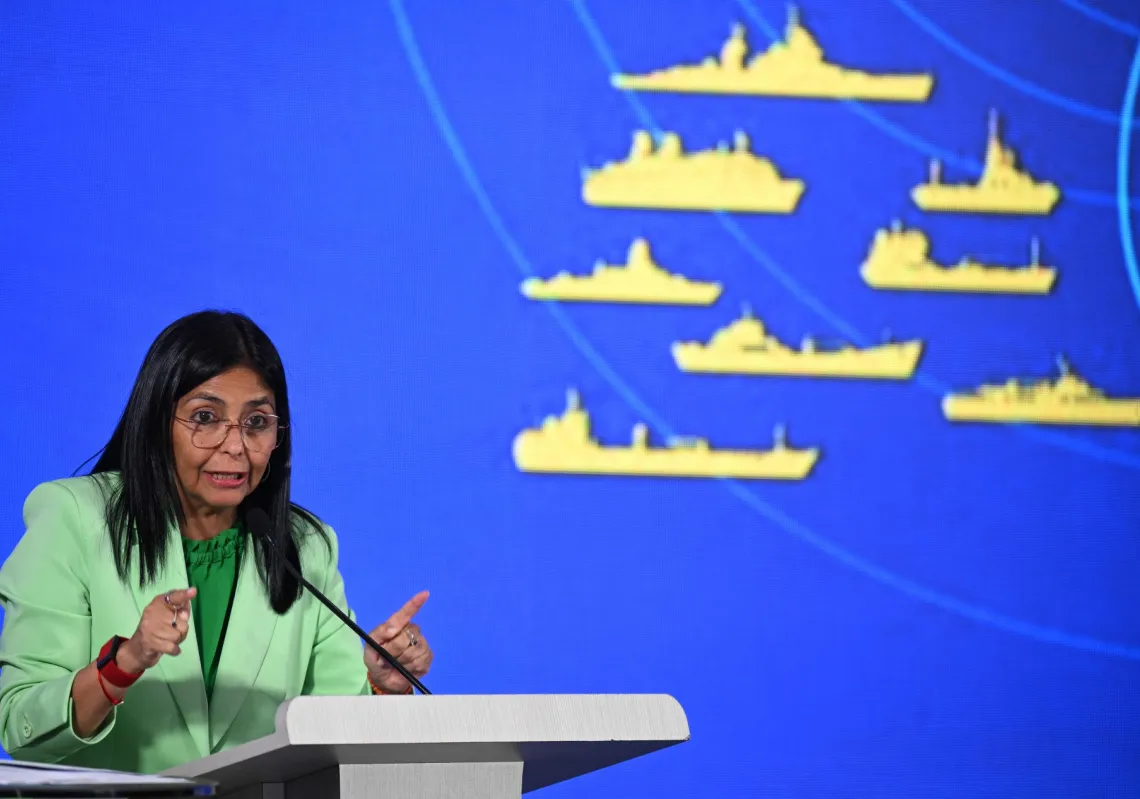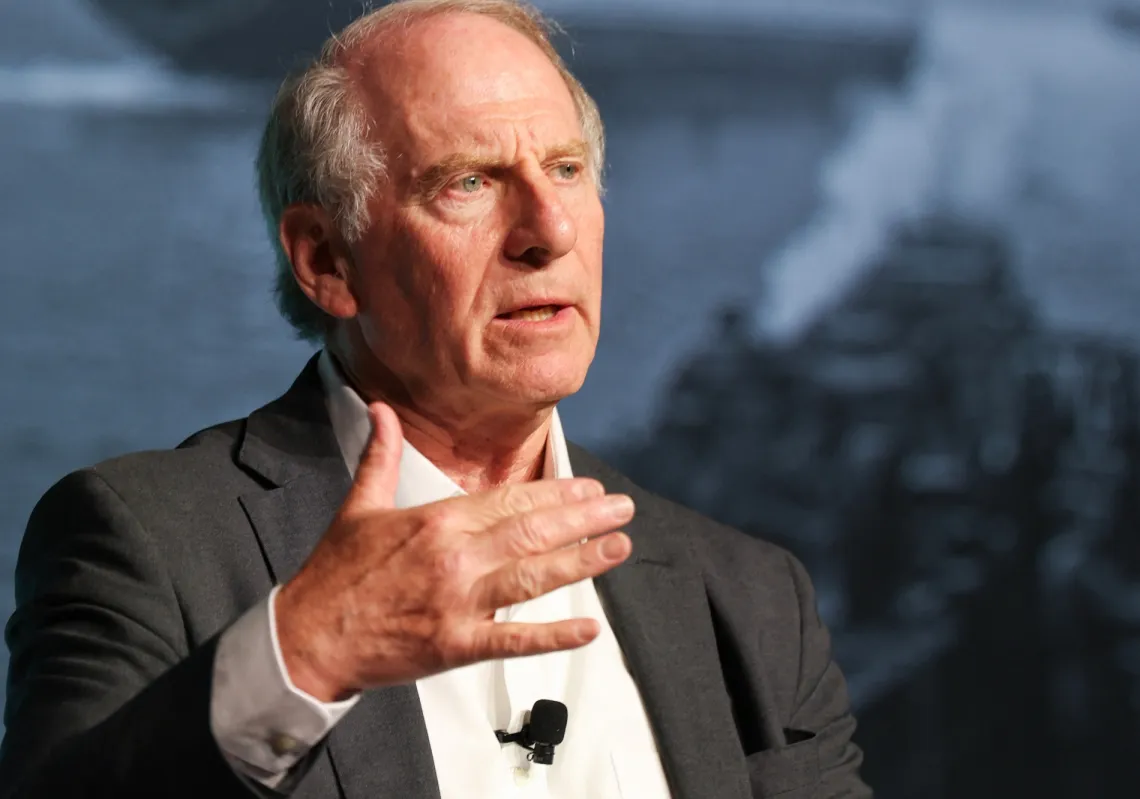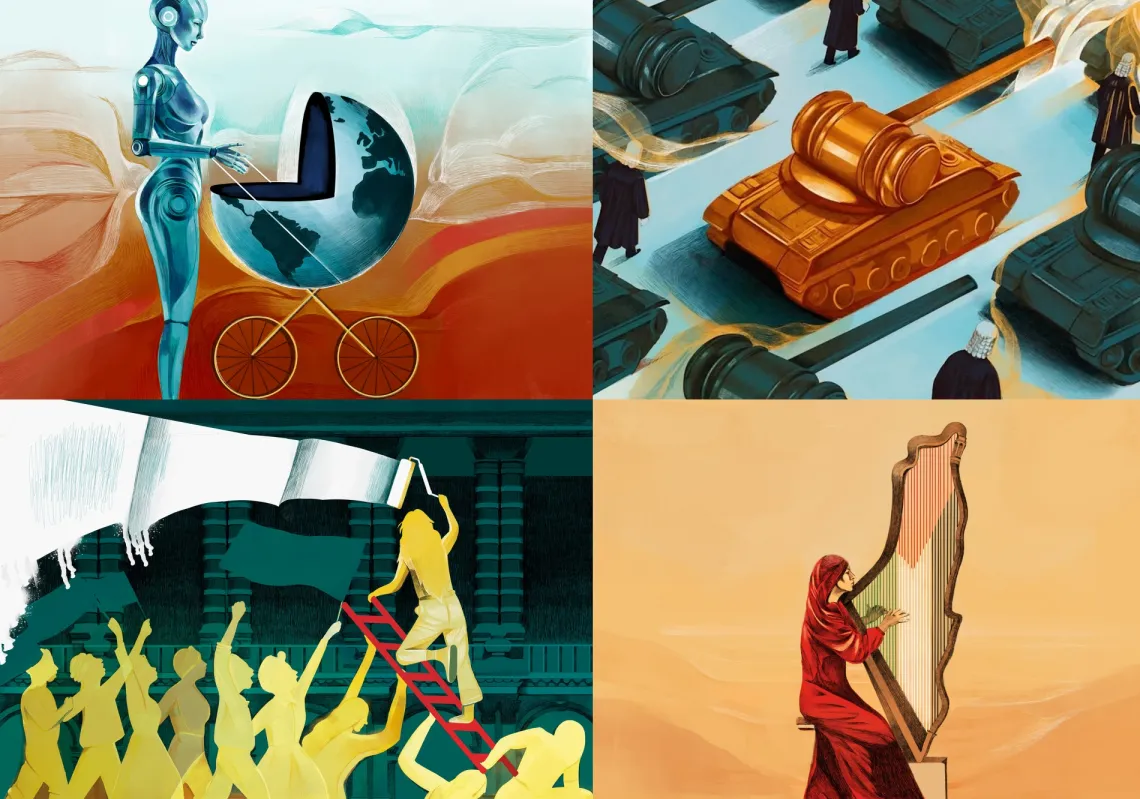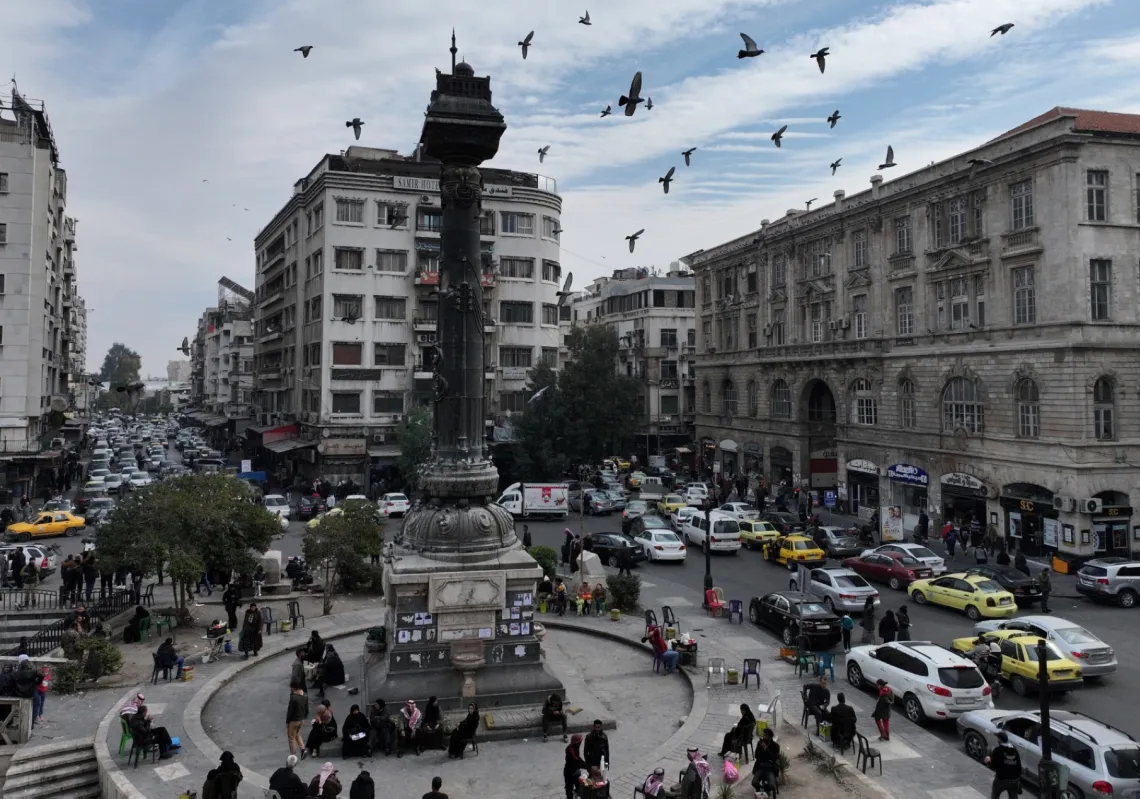Ammar Al-Hakim stresses that Iraq enjoys a balanced relationship with the country's neighbours, including Iran. He voices belief that the call for a federation in Iraq is no longer a priority for the ISCI, though still supporting the federal form of governance.
Al-Hakim notes that the ISCI has failed to establish an electoral alliance with the political bloc of Prime Minister Nuri al-Maliki. He adds that the so-called Saddamists or followers of Saddam still pose a threat to Iraq, reiterating his support for recent measures by the Justice and Accountability Commission (JAC) banning them from running in elections.
The Majalla: It is said that you will not run in the elections. Is this true, and why?
Indeed I decided not to run in the coming elections. I want to convey a message that distributing roles among those who are engaged in serving the public is very important. It is very important for the Iraqi citizens to see that we, who are involved in serving the public, are not keen to hold all positions. The current harsh rivalry to win seats in Parliament and positions in the Council of Ministers or in any other governmental body in the state in Iraq is not in line with the long history of struggle of those historic leaders involved in these rivalries.
Taking these considerations account, I feel that my position at the ISCI gives me the freedom of broad action without any restrictions suffered by those who hold public positions. Such a position gives me the opportunity to adopt the new political project in Iraq and defend public service. Hence, I decided to stay away from the Council of Representatives.
Q: Obviously there is some change in your political discourse regarding stressing Iraq's Arab identity, and the country's position among the Arab countries. Are there any electoral motivations behind such a change, or is it an ideological political change resulting from new convictions?
Arabism is part of our identity and we will never abandon it. Weakness of focusing on this matter in the past might be due to the exceptional circumstances witnessed by Iraq and lack of understanding on part of many fellow Arab countries of the new political experience in Iraq and its outcomes. This has created a kind of confusion in Iraq's relations with the Arab countries. We believe that the opening of Iraq to the Arab world, sharing interests with the Arabs and the existence of a warm relationship between the Arabs and Iraq is essential at this stage. The increased talks and clear focus on this aspect at this stage is consistent with changes in the regional and Arab perspective to Iraq and with the will of the Iraqis who want to strengthen their relation with the Arab countries. Therefore, we have identified at first the press conference, after assuming the presidency of the ISCI, a number of priorities in the performance of the ISCI at this stage. These priorities included focusing on openness to the Arab world and engagements with the Arab countries. Our regional tour and visits to many of Arab countries were in such a context.
Q : What is the shape of your electoral alliance? Are you going to contest the elections in alliance with al-Maliki or others?
Now, as you know, the time is over for forming alliances. The picture has become clear that the Iraqi National Coalition (INC) with its known powers comprises allies and partners such as the ISCI, Badr Organization, the Sadr Trend, Reform Trend, the Party of Virtue, and some 40 political entities from different sectarian, religious, national and political directions. We have exerted great efforts to unify positions of the INC and Maliki's State of Law Coalition to from a single coalition. We did that as we thought that the presence of a large bloc in parliament would help us attract other blocs and consolidate efforts to enhance the national Iraqi project. These efforts, however, have not succeeded, but we have a broad coalition of known forces.
We have tried to compensate for these unsuccessful efforts and the original idea with a broader project involving inviting the INC to form a broad national front that includes the most important political parties and blocs, which are consistent with the INC regarding the programmes of the next stage, on the Iraqi scene.
Q: You were quoted as not objecting to the participation of the Baathists who are not being prosecuted in politics. What is the motive behind such change, given you were of the strongest opponents to any Baathist participation in political life?
We have not called for the participation of the Baathists. Instead, we have called for engaging Iraqi citizens, who were forced to join the Baath Party during a specific period of time because of life pressure and pressure put on them, but have not committed any abuses or have not held top positions in the party. Let us deal with them as Iraqi citizens and let them exercise their natural roles in life. We still believe that the Baath Party is a great danger in terms of its thought and organizations. According to sources from the Iraqi security forces, the party has been involved in the abuse of Iraqi people and in explosions that target innocent citizens at the present time. We believe that Saddam's followers, who committed abuses in the past and do the same now, represent a fundamental threat to the new democratic national project in Iraq. We will not forgive the Baath Party and will not tolerate Saddam's followers. We are open to citizens who were forced to join the party without committing abuses in the past or in the present.
Q: It was notable that activity of the JAC was revived before the elections. This raises the belief that there were retaliatory political goals behind this move? Don’t you believe that such a move is contradictory with democracy, given that the majority of those banned from running in elections have participated actively in the political life after the fall of the former regime?
No country is to blame for enforcing laws ratified and legislated in parliament via effective participation and voting by MPs. According to the Justice and Accountability Law, that received a sweeping majority vote at the time of passing it, candidate in elections should be endorsed by the JAC, particularly those covered by the law. We reject that this move is based on political or aggressive goals. We reject politicizing laws or dealing with citizens in a selective manner. I think that such accusations lack many facts. Some people considered that the banning decision of JAC target a certain sect. Facts show that two thirds of those banned are Shiites, and one third involves Sunnis. Therefore, if a certain sect is targeted, it is one that two thirds of candidates banned belong to it, not the sect that to which one third of candidates banned belongs.
I do not think that aggression has been involved in this matter. Enforcing law is an important thing and we place great importance on working hard to broaden participation and to give opportunity to all people who meet the specifications and other conditions of running in elections. We believe that adherence to the Constitution is the key in any democratic country in the world. We do not know any exceptions, regarding that rule, which can allow candidates to run for office in the most important institution in the Iraqi state, the parliament, without meeting constitutional requirements.
What substantiates this attitude is the fact that most of the banned people have not contested the decision of banning them from running in elections. Out of more than 560 people, only 68 submitted appeals against the decisions to ban their running in elections, which means that nearly 500 people did not present appeals and they accepted the decision. Their lists also accepted the decision and soon nominated alternative candidates. This means that they accepts this decision and understand it. So why are other parties questioning the decision. The problem lies with those 68 people who have made appeals and the court is now looking in their appeals to be sure of correctness, or otherwise, of decision to ban their running in elections.
Q: It is clear from your statements, especially during your last visit to Lebanon, that you are seeking greater openness to Arab states. Is it an attempt to achieve a kind of balance to your strong relations with Iran?
Iraq has good relations with neighboring Iran and has justifications for these relations: the long geographical borders which extend to 1400 km, and joint historical, economic and political interests. We want to start a new stage that involves respect for sovereignty and sharing interests with all countries of the region. Iran is one of the important neighbors of Iraq. Engagement with the Arab countries and sharing interests with them, in order to achieve a balance in regional relations of Iraq, is an important approach for us and is a key motive that gives us enthusiasm to reassure Arab countries and encourage them to have a positive and constructive role in dealing with the situation in Iraq.
Q : Some people accuse the ISCI that it was previously implementing Iran's policies in Iraq. What is your position?
We are not an opposition group operating underground and are required to explain their positions. We are a big political entity and we have broad popular bases and have offices and our political positions are known. In addition, our representatives in parliament, in the cabinet and in the Iraqi state institutions are well known. Today, and after seven years of building political experience in Iraq, major powers like the ISCI, are not supposed to be regarded doubtfully in relation to their positions. It is known that we have taken many positions on very sensitive issues that went in different directions from those of the Islamic Republic's interests. We respect the Islamic Republic and appreciate their consideration for their interests, but we are Iraqis and we act upon Iraq's national interest when we estimate our positions.
Q: What is your position towards Iran's move to control Iraq's Fakkah oil field?
Since the first hours after receiving this news, we started following up the issue and we considered raising the Iranian flag on this well as a wrong act. We expressed this through the media and handled the issue through communication with officials. We believe that our communications and follow-up have had a fundamental role in solving this problem.
The ISCI differs from some political parties regarding their mechanisms of action. However, we believe that is important to address the issue and not to deliver fiery statements in the media. Therefore, the ISCI did not make such statements when we had problems with many neighboring countries in the region. Instead, we adopted a calm policy and searched for solutions, and exerted diplomatic efforts and political contacts to resolve dilemmas and promote confidence with others. Iraq today is not a country of rivalries, animosities, and fiery statements that complicate issues, rather than contribute to solving them.
Q: Some people say that changes in your position resulted from changes in the Iraqi popular mood in the pre-election period?
Our project was clear and had been adopted by Ayatollah Mohammad Baqer al-Hakim. He introduced it in a clear and open manner for more than two decades since the fall of the regime. The ISCI also put forward a clear national project to build the new Iraq in a way that achieves social justice, independence, sovereignty, freedom for citizens, equal opportunities and genuine partnership between the elements and sectors of the Iraqi people. Moreover, many of the concepts put forward in the national project by the ISCI we were pleased to find them facts in the Iraqi constitution today and in the mainstream of the political process in the country. This does not prevent changes in the Iraqi political scene. The ISCI as an important political entity monitors and controls its own performance and movement and diagnoses errors in its performance, whether they are its political or regulatory system or its communication mechanisms with the people. The ISCI addresses, corrects and develops its performance. There is an ability to assesses variables and formulate a discourse and performance in line with these changes to keep pace changes. Life goes on and no political entity can shut itself to the world. It can't suffice with its concepts without renewal and reform, in line with developments and keep pace with global variables inside the region and the world. We believe that a political entity must be flexible and we underline fundamentals and develop in the details that are consistent with the expectations of the Iraqi people including the different powers and political leaders.
Q : There is also a lot of talk about a change in your position regarding the Kirkuk issue. You opposed making Kirkuk part of the Kurdistan Province and emphasized its Iraqi identity. Will this have an impact on your strong coalition with the Kurdistan Alliance?
Where did this impression come from? We always said that Kirkuk represents a small model of Iraq. It has a good mix of nationalities, sects and religions. We have also called for a peaceful coexistence between the different sects in Kirkuk based on love and mutual respect. We also called for the respect of the will of the people of Kirkuk and their decision to run their affairs in the way they see fit. This was, and still is, our official position. All our relationships and alliances with Iraqi political parties, including the Kurdistan Alliance, have only one goal: to serve the interests of the country. These alliances were formed under the constitution and the law, for the purpose of defending the rights of all citizens.
Q : Do you still adhere to your previous position of establishing a federation in central and south of Iraq?
This is not just the position of the ISCI. It is a constitutional fact. Under the federal system mentioned in the constitution for the building of the Iraqi state and its administrative formations, it is possible to form federal regions. This new administrative system may be new to the Iraqis. Thus, the ISCI tried to explain this constitutional right on several previous occasions. But today the ISCI does not see a need for making this matter one of its top priorities. It is a guaranteed right for the Iraqis, and they may fulfill it whenever they wish. They are also free not to implement it at that time or at a later time. The decision is entirely theirs. But we believe that it is our duty, as one of the political forces, to explain the constitution, which the Iraqi people voted for, and show the Iraqis their rights, then leave it to them to choose.
Q: Many analysts believe that Iraqi religious parties have lost a lot of their influence, and that the scene has become open for secular parties, what do you think?
We respect all political parties and respect the Iraqi voter's choices. The Iraqi people are free to give their trust to whom they see worthy of it. However, the recent elections of the provincial councils have shown the powerful status of the Arab Islamic forces, especially in the Arab areas located in the provinces of the south and north of Baghdad. Also, the basic forces shaping today's national coalition are Islamist forces, which have won more than (90%) of the seats of south of Baghdad, and more than (70%) of the seats of Baghdad. This confirms that the Iraqi people still trust the Islamic forces. I don’t know background of this impression that says that there is decline in the power of Islamic forces.
Q: You spoke in Beirut about the absence of an Arab role in Iraq. What role did you expect the Arabs to play? And what do you think the objectives of this role might be?
We are looking for a strategic relationship between Iraq and Arab countries at all levels, including the political, economic and security levels. Iraq is an Arab country. The majority of its citizens are Arabs. Its Arab identity, history, and culture are bright and clear. Therefore, there should be joint and real interests between the Arab countries and Iraq. In addition, Iraq should build good relations with the important countries in the region, such as Turkey and Iran, as well as the rest of the world. We want the new Iraq to be a friendly Iraq that enjoys strong relations with other countries, and not a hostile and isolated Iraq.
Q : Don't you think that the ISCI is to blame for the absence of an Arab role in Iraq in the past?
We believe that the Iraqis are partly to blame for the Arab countries' hesitation to engage in Iraq. Arab countries are concerned about the democratic political project in Iraq and its outcomes. Iraqis should have made an effort to explain the new political reality in Iraq in order to reassure the Arab States and eliminate their concerns. The Arab states should also open their doors, arms, and minds to reach out and listen to the Iraqis. They should try to understand the new phase that Iraq is going through. Iraq and the Arab States share responsibility in this matter. We are not saying that that the Arab countries take full responsibility. But this does not also mean that the Iraqis are the ones to take full responsibility. I think the Iraqis have made a lot of efforts. Today, they focus more on this aspect, and we hope that the pace of understanding and openness between the Arabs and Iraq will continue. As a major political entity in the Iraqi scene, the ISCI is partly responsible for this matter. Therefore, in the press conference, which I held after becoming the President of the ISCI, I declared several priorities, including openness to the Arabs. Also, I have taken practical steps in this regard. I made a regional tour that included many Arab countries. We hope that our efforts and those of our partners in the political process, in addition to other national efforts, might be able to solve this problem. We hope to see a growing and deep-rooted relationship between the Arab countries and Iraq.
Q: Why did you choose Lebanon as a start point to your Arab openness? Is it because of the powerful Shi'ite existence in Lebanon?
Lebanon was not the first country we visited, but the last one in our regional tour, which included many Arab countries. Lebanon is an important country in terms of early democracy, and media openness, which enjoys a great degree of follow-up and monitoring from the Arab world. Therefore, it was an important opportunity to communicate with the political and spiritual leaders of Lebanon. We also participated in social and scientific events. We tried to communicate with the Arab world through the Lebanese media. Lebanon represents an important window for Iraq to communicate with the Arab world. These were the reasons behind our visit to Lebanon.
Q: Do you still hold your position regarding paying financial compensation to Iran for the Iran-Iraq war?
We never supported the payment of such compensation. The statement of His Eminence Sayyed Al-Hakim in 2003, which he delivered while he was holding the rotating presidency of the Governing Council, was misunderstood. His Eminence had made our position clear through speeches and official statements which he delivered. We have always called for the kind countries, which Iraq is indebted to, to drop these financial commitments and debts in order to help Iraq and its new political experience. The ISCI played a key role in abolishing more than 80% of Iraq's debts. These debts exceed $110 billion. This was made through the efforts of the former Iraqi Minister of Finance His Excellency Dr. Adel Abdul-Mahdi, and also the current Minister of Finance Mr. Baqr Jabr al-Zobidy. Those two leading figures in of the ISCI played a major role in paving the way for talks with the concerned countries, and handled this issue in an efficient and serious way. They were the ones behind this great victory for Iraq. More than 80% of Iraq's debt has been dropped. We support the idea of convincing these countries to deal positively with the reality in Iraq.
Interview conducted by Shereen Al-Faedy








